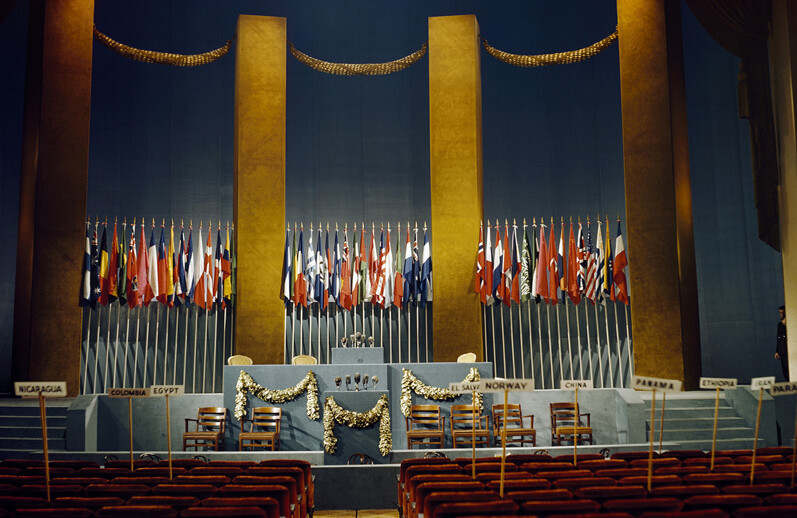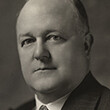"In all, the San Francisco Conference was not only one of the most important in history but, perhaps, the largest international gathering ever to take place."--United Nations
The United Nations Conference on International Organization (UNCIO) was a convention of delegates from 50 Allied nations that took place from April 25-June 26, 1945 in San Francisco. The delegates reviewed and rewrote the Dumbarton Oaks agreements of the previous year and this resulted in the creation of the United Nations Charter, which was signed by the Allies on June 26.
Henry Atkinson, head of the Church Peace Union (now Carnegie Council) attended as one of the 42 official consultants appointed to the U.S. delegation. As Atkinson writes in this report, "This group of consultants was called together by Mr. Stettinius [chairman of the U.S. delegation] who explained what he had in mind, saying in effect that our international relations must be agreed to by public opinion and that this group, representing from eighty to one hundred million people, will have a large influence in building up public opinion to support the findings of this conference. The group is not to form policy nor it it a 'pressure group,' but it is to be kept informed and to communicate with the 'folks back home.'"
Sadly, President Roosevelt did not live to attend the conference, for which he had worked so hard. He died suddenly on April 12, just 11 days before it convened.
Excerpt from the World Alliance News Letter, May 1945Published by the Church Peace Union (now Carnegie Council) and the American Council of the World Alliance
Dr. Henry A. Atkinson is representing the Church Peace Union at the San Francisco Conference of the United Nations, in response to the invitation of the State Department to serve as one of the consultants. His initial impressions are given in the following paragraphs:
The most important conference in our generation began its work here in San Francisco today. A feeling of deep solemnity brooded over the 4,000 people packed into the beautiful opera house. When Secretary Stettinius rapped for order and asked that all join in a minute of silent meditation, every head was bowed and complete stillness reigned. I am sure that all felt that in some way Franklin Delano Roosevelt was very near at that moment.
Dramatic Occasion
San Francisco has had some dramatic moments in her colorful history, but nothing has ever made a deeper impression on her citizens nor commanded so completely their loyal devotion to a single cause.
In addition to the large delegations, 1,500 newsmen, radio commentators, photographers, and other technicians are here. there are also several hundred representatives from national and international organizations, all leaders in the work that has been done in mobilizing public opinion behind the war effort.
There is everywhere an air of expectancy. As Secretary MacLeish said, "A golden hope sustains the people who have come here as well as the citizens who have given us such a welcome."
The opening proceedings were simple in the extreme. There were very few men who wore formal dress. No silk hats were in evidence. Mr. Stettinius presided with dignity and tact. The address of President Truman was sincere and made a fine impression. Governor Warren and Mayor Lapham also said the right things with proper emphasis. The memory of President Roosevelt was fresh in every heart. The very simplicity and lack of ostentation of the conference led a friend who sat near me to remark, "I feel that our departed President is here brooding over these proceedings."
Items on the Agenda
The purpose of this gathering is to form a general world organization to safeguard the peace and promote the common welfare of the nations and their peoples. The plan agreed upon at Dumbarton Oaks will form the agenda. But beyond the mechanism and the proposals already agreed upon, there are major issues that will emerge.
It is too early to say what the tension points may be. At the present time to the man on the street the most serious issue seems to be the number of votes to be given the Great Powers in the assembly.
Another question is that of membership in this conference itself. This involves Poland and Argentina. It is reported that all the South American states want Argentina to come in. The matter of Poland is not whether she shall have membership, but who shall represent her. The question of Polish frontiers, however, is not on the agenda at this conference. But the question of small nations will come up for discussion. Behind it all is the issue in regard to Russia. The Chinese delegation seated a communist delegate. He states definitely that he is not here as a communist but that his appointment indicates an essential unity within China itself. The smaller nations are inclined to question the way power is to be used to maintain peace. They want to know how much authority they will have in the Security Council and are saying very definitely that this whole issue must be reconsidered.
Another question is that of trusteeship and the future of the mandated areas. Palestine is the only mandate still held by anyone of the nations and there is considerable sentiment, I understand, among certain Jewish groups that the mandate be retained by Great Britain.
Innovation of Consultants
When President Wilson proposed open covenants openly arrived at as a procedure among the nations in dealing with each other, the suggestion was something new. In this conference the State Department has made another innovation which is truly revolutionary. Secretary Stettinius invited forty-two national organizations in the United States to name each one delegate to be officially related to the conference. These forty-two representatives are known as consultants to the American delegation. The State Department made all the arrangements for these delegates, furnished them with the same credentials that the representatives of the governments have and the same privileges except attending the committee meetings called for specific purposes by the official delegates.
This group of consultants was called together by Mr. Stettinius who explained what he had in mind, saying in effect that our international relations must be agreed to by public opinion and that this group, representing from eighty to one hundred million people, will have a large influence in building up public opinion to support the findings of this conference. The group is not to form policy nor it it a "pressure group," but it is to be kept informed and to communicate with the "folks back home".
The fundamental task of this conference is to build a world structure and if this can be done, the other issues can be settled. We have every reason to continue our prayers and strengthen in the outcome of these San Francisco deliberations.




